北邮实用大学英语第二册第二单元教案
- 格式:doc
- 大小:361.00 KB
- 文档页数:11
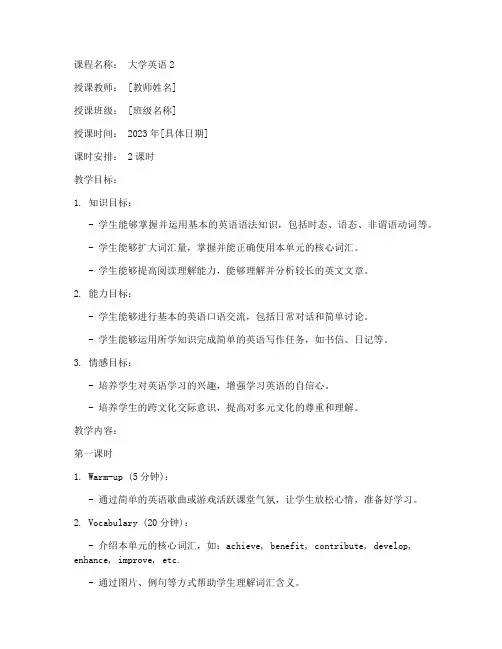
课程名称:大学英语2授课教师: [教师姓名]授课班级: [班级名称]授课时间: 2023年[具体日期]课时安排: 2课时教学目标:1. 知识目标:- 学生能够掌握并运用基本的英语语法知识,包括时态、语态、非谓语动词等。
- 学生能够扩大词汇量,掌握并能正确使用本单元的核心词汇。
- 学生能够提高阅读理解能力,能够理解并分析较长的英文文章。
2. 能力目标:- 学生能够进行基本的英语口语交流,包括日常对话和简单讨论。
- 学生能够运用所学知识完成简单的英语写作任务,如书信、日记等。
3. 情感目标:- 培养学生对英语学习的兴趣,增强学习英语的自信心。
- 培养学生的跨文化交际意识,提高对多元文化的尊重和理解。
教学内容:第一课时1. Warm-up (5分钟):- 通过简单的英语歌曲或游戏活跃课堂气氛,让学生放松心情,准备好学习。
2. Vocabulary (20分钟):- 介绍本单元的核心词汇,如:achieve, benefit, contribute, develop, enhance, improve, etc.- 通过图片、例句等方式帮助学生理解词汇含义。
- 进行词汇练习,如:填空、匹配、翻译等。
3. Grammar (20分钟):- 讲解现在完成时态的基本用法,包括结构、时态标志词等。
- 通过例句和练习帮助学生掌握现在完成时态。
- 进行语法练习,如:改错、选择题等。
4. Reading (15分钟):- 选择一篇适合学生水平的英文文章,进行阅读理解练习。
- 引导学生分析文章结构,理解文章大意。
- 进行阅读理解练习,如:判断正误、填空、回答问题等。
第二课时1. Review (10分钟):- 复习第一课时的内容,通过提问或小组讨论的方式检查学生的学习情况。
2. Speaking (20分钟):- 组织学生进行角色扮演或小组讨论,运用所学词汇和语法知识进行口语交流。
- 鼓励学生表达自己的观点,提高口语表达能力。
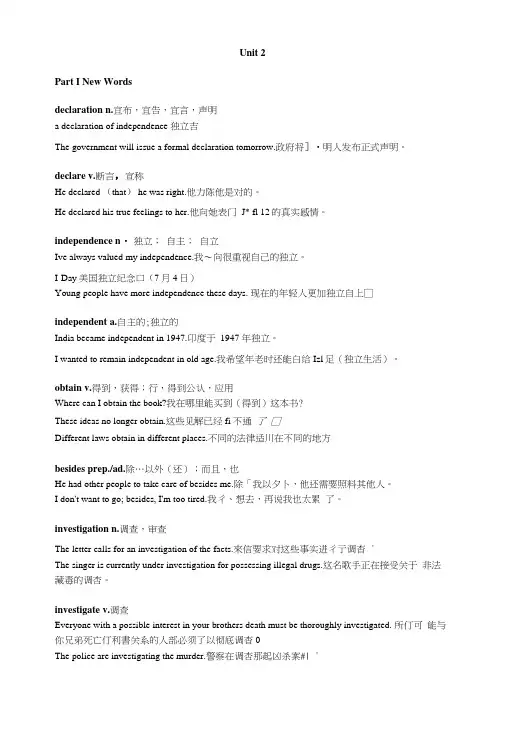
Unit 2Part I New Wordsdeclaration n.宜布,宜告,宜言,声明a declaration of independence 独立吉The government will issue a formal declaration tomorrow.政府将]•明人发布正式声明。
declare v.断言,宣称He declared (that) he was right.他力陈他是对的。
He declared his true feelings to her.他向她表门J* fl 12的真实感情。
independence n・独立;自主;自立Ive always valued my independence.我〜向很重视自己的独立。
I-Day美国独立纪念口(7月4日)Young people have more independence these days. 现在的年轻人更加独立自上□independent a.自主的;独立的India became independent in 1947.卬度于1947 年独立。
I wanted to remain independent in old age.我希望年老时还能白给Izl足(独立生活)。
obtain v.得到,获得;行,得到公认,应用Where can I obtain the book?我在哪里能买到(得到)这本书?These ideas no longer obtain.这些见解已经fi 不通了□Different laws obtain in different places.不同的法律适川在不同的地方besides prep./ad.除…以外(还);而且,也He had other people to take care of besides me.除「我以夕卜,他还需要照料其他人。
I don't want to go; besides, I'm too tired.我彳、想去,再说我也太累了。
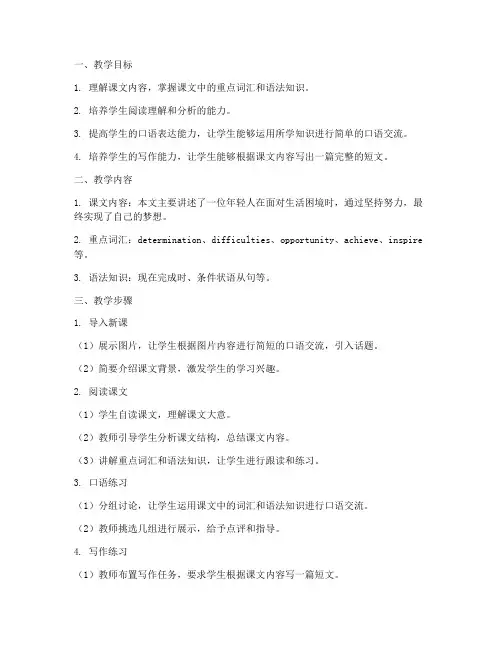
一、教学目标1. 理解课文内容,掌握课文中的重点词汇和语法知识。
2. 培养学生阅读理解和分析的能力。
3. 提高学生的口语表达能力,让学生能够运用所学知识进行简单的口语交流。
4. 培养学生的写作能力,让学生能够根据课文内容写出一篇完整的短文。
二、教学内容1. 课文内容:本文主要讲述了一位年轻人在面对生活困境时,通过坚持努力,最终实现了自己的梦想。
2. 重点词汇:determination、difficulties、opportunity、achieve、inspire 等。
3. 语法知识:现在完成时、条件状语从句等。
三、教学步骤1. 导入新课(1)展示图片,让学生根据图片内容进行简短的口语交流,引入话题。
(2)简要介绍课文背景,激发学生的学习兴趣。
2. 阅读课文(1)学生自读课文,理解课文大意。
(2)教师引导学生分析课文结构,总结课文内容。
(3)讲解重点词汇和语法知识,让学生进行跟读和练习。
3. 口语练习(1)分组讨论,让学生运用课文中的词汇和语法知识进行口语交流。
(2)教师挑选几组进行展示,给予点评和指导。
4. 写作练习(1)教师布置写作任务,要求学生根据课文内容写一篇短文。
(2)学生独立完成写作任务。
(3)教师批改作文,给予点评和指导。
5. 课堂小结(1)回顾本节课所学内容,强调重点词汇和语法知识。
(2)布置课后作业,巩固所学知识。
四、教学评价1. 课堂表现:观察学生在课堂上的参与度、口语表达能力和写作水平。
2. 课后作业:检查学生的作业完成情况,了解学生对本节课内容的掌握程度。
3. 课堂测试:通过课堂测试,评估学生对本节课重点词汇和语法知识的掌握情况。
五、教学反思本节课通过阅读、口语和写作等多种形式,让学生在轻松愉快的氛围中学习英语。
在教学过程中,教师应注重激发学生的学习兴趣,培养学生的阅读理解、口语表达和写作能力。
同时,教师应关注学生的个体差异,给予学生充分的关注和指导,提高学生的学习效果。
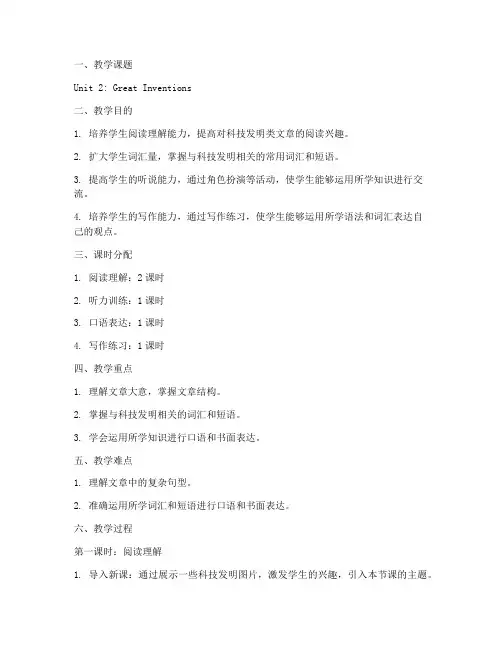
一、教学课题Unit 2: Great Inventions二、教学目的1. 培养学生阅读理解能力,提高对科技发明类文章的阅读兴趣。
2. 扩大学生词汇量,掌握与科技发明相关的常用词汇和短语。
3. 提高学生的听说能力,通过角色扮演等活动,使学生能够运用所学知识进行交流。
4. 培养学生的写作能力,通过写作练习,使学生能够运用所学语法和词汇表达自己的观点。
三、课时分配1. 阅读理解:2课时2. 听力训练:1课时3. 口语表达:1课时4. 写作练习:1课时四、教学重点1. 理解文章大意,掌握文章结构。
2. 掌握与科技发明相关的词汇和短语。
3. 学会运用所学知识进行口语和书面表达。
五、教学难点1. 理解文章中的复杂句型。
2. 准确运用所学词汇和短语进行口语和书面表达。
六、教学过程第一课时:阅读理解1. 导入新课:通过展示一些科技发明图片,激发学生的兴趣,引入本节课的主题。
2. 阅读课文:学生自主阅读课文,了解文章大意,掌握文章结构。
3. 翻译练习:学生翻译文章中的重点句子,巩固词汇和语法知识。
4. 课堂讨论:针对文章中的关键问题进行讨论,加深对文章内容的理解。
第二课时:听力训练1. 导入新课:通过播放一段与科技发明相关的英语听力材料,激发学生的兴趣。
2. 听力练习:学生听录音,回答问题,提高听力理解能力。
3. 课堂讨论:针对听力材料中的关键问题进行讨论,加深对内容的理解。
第三课时:口语表达1. 导入新课:通过展示一些科技发明图片,激发学生的兴趣,引入本节课的主题。
2. 角色扮演:学生分组进行角色扮演,模拟科技发明场景,运用所学知识进行交流。
3. 课堂讨论:针对角色扮演中的问题进行讨论,提高口语表达能力。
第四课时:写作练习1. 导入新课:通过展示一些科技发明案例,激发学生的写作兴趣。
2. 写作指导:教师讲解写作技巧,指导学生如何运用所学知识进行写作。
3. 写作练习:学生根据所学知识,撰写一篇关于科技发明的短文。
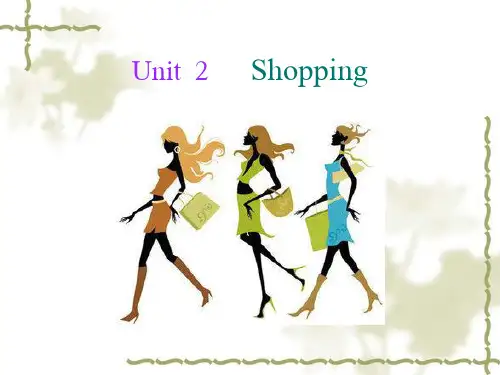
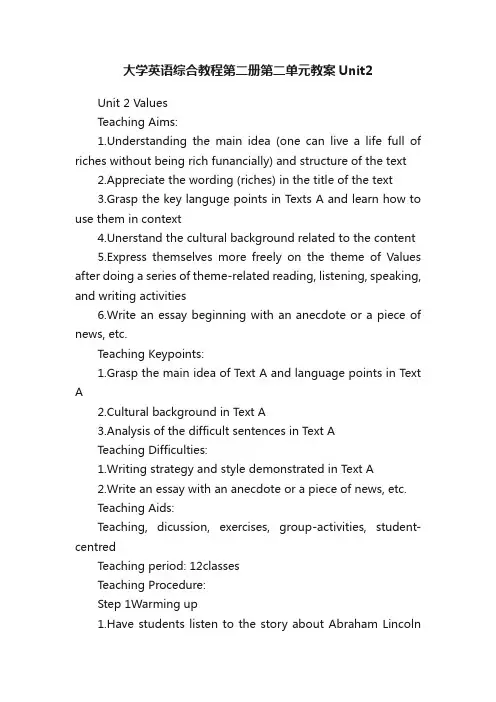
大学英语综合教程第二册第二单元教案Unit2Unit 2 ValuesTeaching Aims:1.Understanding the main idea (one can live a life full of riches without being rich funancially) and structure of the text2.Appreciate the wording (riches) in the title of the text3.Grasp the key languge points in Texts A and learn how to use them in context4.Unerstand the cultural background related to the content5.Express themselves more freely on the theme of Values after doing a series of theme-related reading, listening, speaking, and writing activities6.Write an essay beginning with an anecdote or a piece of news, etc.Teaching Keypoints:1.Grasp the main idea of Text A and language points in Text A2.Cultural background in Text A3.Analysis of the difficult sentences in Text ATeaching Difficulties:1.Writing strategy and style demonstrated in Text A2.Write an essay with an anecdote or a piece of news, etc.Teaching Aids:Teaching, dicussion, exercises, group-activities, student-centredTeaching period: 12classesTeaching Procedure:Step 1Warming up1.Have students listen to the story about Abraham Lincolnbefore class, lead them to finish the exercises on page31, check the answer and explain.2.Have students learn more about the fact that economic development and personal income can't always account for happiness.3.Do you think rich people must be happier than poor people? Why?4.Do you think a poor person can have a life full of riches? How?5.In class, students form two camps to debate the following issue: Mother Teresa has no money, but she took care of the poor in Calcutta until her death. Bill Gates gave a lot of money to charity, but he seldom works in the “frontline”with the poor. Does the world need more love like Mother Teresa's or more money like Bill Gates'?Step 2 Global analysisi of Text A1. Division of the T ext APart1:The writer's encounter with a boy who raised the question “Are you poor?”Part2:In search of an answer the writer finds that not having expensive possessions doesn't make him feel poor mainly because he enjoys life in many other ways.Part3:In conclusion, the writer thinks he's grown to understand more about himself because of the boy's question.2.Understanding the main idea of the text with the help of the questions on page 37-38Step 3. Detailed leaning of Text A1. It was early December 2003, my first season as a Salvation Army bell ringer, whenI was confronted with the questionWhat does a Salvation Army bell ringer do?To ring the bell and ask people to donate money to help the poor.vt. 2. confront:1) (of a problem, difficulty, etc.) face (sb.) threateninglyThe difficulties that confront us seem insuperable.A major difficulty that confronts international students is how best to judge the quality of a program in a foreign university2) (of a person) face and deal with (a problem, difficulty, etc.)军人必须面对危险和死亡。
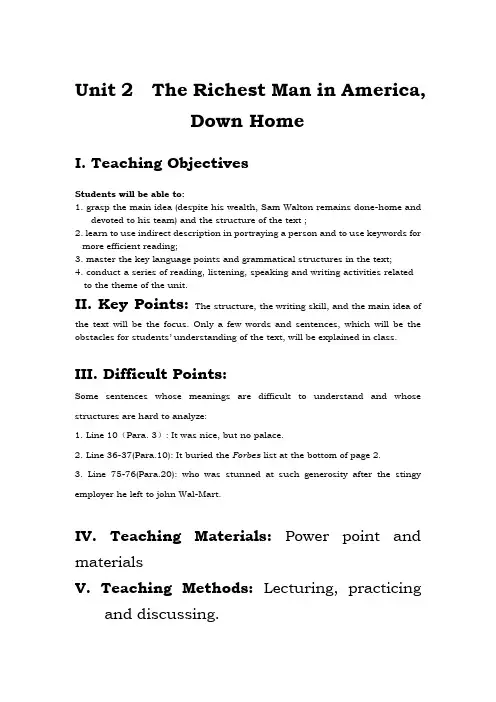
Unit 2 The Richest Man in America,Down HomeI. Teaching ObjectivesStudents will be able to:1. grasp the main idea (despite his wealth, Sam Walton remains done-home anddevoted to his team) and the structure of the text ;2. learn to use indirect description in portraying a person and to use keywords for more efficient reading;3. master the key language points and grammatical structures in the text;4. conduct a series of reading, listening, speaking and writing activities relatedto the theme of the unit.II. Key Points: The structure, the writing skill, and the main idea ofthe text will be the focus. Only a few words and sentences, which will be the obstacles for students’ understanding of the text, will be explained in class.III. Difficult Points:Some sentences whose meanings are difficult to understand and whose structures are hard to analyze:1. Line 10(Para. 3): It was nice, but no palace.2. Line 36-37(Para.10): It buried the Forbes list at the bottom of page 2.3. Line 75-76(Para.20): who was stunned at such generosity after the stingy employer he left to john Wal-Mart.IV. Teaching Materials: Power point and materialsV. Teaching Methods: Lecturing, practicing and discussing.VI. Teaching Timing: 8 sessions of classVII. Teaching Process:1st -2nd periods:Pre-reading; Teacher’s Introductory Remarks and Students’ Discussion related to the topic.3rd -4th periods: While-Reading (Understanding the title of text A; Analyzing the organization of the text; Explaining Difficult sentences and language points in the text; Summing up the main idea of the text)5th-6th periods: Dealing with the exercises aft er Text A. Check on Ss’ home reading (Text B); Post-Reading Task: Theme-Related Language Learning Tasks7th-8th periods: Listening and speaking tasks.A. Pre-reading tasks1. T asks Ss the following questions on the recorded passage:—What happened to Abraham Lincoln one day? (Working as a shop clerk, he overcharged a customer. Although the sum was insignificant, Lincoln walked a long distance to return the money. )— How is the story related to the theme of the unit— values? (Abraham Lincoln regarded honey as an important value)2. Ss do Cloze B in after-text exercises to learn more about the values of American millionaires.3. Rich people I know (15 minutes)1) Before class, Ss are asked to collect stories, news reports, pictures, books, or even video clips (if relevant equipment is available for showing them in class) of rich people.2) In class, Ss form groups of three to four to share what they have collected.3) Groups discuss what values these rich people hold dear.4) Speakers for several groups report their discussion results to the class.5) T reminds Ss to keep these values in mind when they study Text A, and see whether Sam Walton cherishes them or not.B. While-reading tasks1. Text organization (20 minutes)1) T asks Ss to scan the text to see if there is any natural dividing lines separating it into par (The text can be divided into three parts. Between each part, there is a blank line.)2) T draws Ss’ attention to Text Organization Exercise 2, guides them through the directions, that they can grasp the main function of each part.Ss scan the text again to underline all the names mentioned and tell who these persons are.(They are: Jamie Beaulieu, waiter at Sam Walton’s birthday partyJonnie Baker, night manager at the local Wal-MartRichard Hoback, Mayor of Bentonville, ArkansasGordon Garlington, pastor of the local churchJohn Marshall, local barberJim Von Gremp, corporate affairs directorFerold F Arend, retired president of Wal-MartJim Hendren, company lawyer4) Ss will notice that the text transits from Part II to Part IIIwhen the first corporate job -corporate affairs director — is mentioned.2. T explains language points and gives Ss practice (seeLanguage Study). (60 minutes)3. Finding synonyms or synonymous phrases for “down-home”(10 minutes)1) T asks some Ss to explain the title of Text A in their ownwords.2) Ss work alone to find out synonyms or synonymous phrasesfor “down-home”.3) Some Ss report their findings to the class.(Para 5 carry on like plain folksPara 6 folksy waysPara 7 friendly, cheerful, a fine neighbor who does his best to blend in, never flashy, never throwing his weight aroundPara 11 not a front-page person)4) T reminds Ss to vary their own writings by synonyms or synonymousphrases.C. Post-reading tasks1 Using indirect description in portraying a person (25 minutes)1) Ss complete Text Organization Exercise 2 and compare answers with eachother.2) T makes Ss think by asking Ss this question: How does the author revealthese character traits of Sam Walton? Does he come forward to tell usdirectly what Sam Walton is like?T introduces methods of indirect description and writes them down on the blackboard: anecdotes, examples, quotes, comparison and contrast, etc.Ss work in pairs to find out examples of these methods.5) Some pairs report their findings to the class.6) T urges Ss to adopt these methods when describing a person.2. T guides Ss through some after-text exercises. (25 minutes)3. T checks on Ss’ home reading (Text B). (3 minut es)4. Ss do Part IV: Theme-Related Language Learning Tasks. (1 period)5. T asks Ss to prepare the next unit: (2 minutes)1) do the pre-reading task;2) preview Text A.VIII. Assignments:Assignments for 1st and 2nd periods:●Vocabulary Exercises I, II, III in Text A●Listen to the recording of the textAssignments for 3rd and 4th periods:●Review what have been learned in class●Comprehensive Exercises, I, II in Text A●Read the text fluently and imitate the pronunciation and intonation of therecordingAssignments for 5th and 6th periods:●Review what have been learned in class●Language Practice in Text B●Preparations for paragraph recitation and dictation of new words andexpressions in Unit 2Assignments for 7th and 8th periods:●Review what have been learned in class●Home listening: Task 1, 2 and 3●Previewing text A in Unit 3IX. Teaching Reflection:Try to listen to the feedback of the students during and after the course, analyze the weaknesses in teaching and improve the methods as much as possible.The feedback from the students:The methods taken to improve the teaching and learning:X. Appendix: Teaching Contents:A. Text AnalysisTo make a character portrait convincing, an author must refrain from telling readers directly what the person is like. Instead, he/she lets readers deduce.Of all the methods of indirect description, the one used most frequently in Text A is quotation. The author quotes not only Sam Walton himself, e.g. “Th e reason for our success... is our people and the way they’re treated and the way they feel about their company. They believe things are different here, but they deserve the credit”, but also his townsfolk and colleaguesThe text begins with an anecdote: how waiter Jamie Beaulieu had anticipated a lavish mansion at the Waltons, only to find an ordinary-looking household. This kind of beginning lures readers to go on. There are other anecdotes, like how Sam Walton forgot his wallet and insisted on fetching it to pay the local barber, and how he lost 4 straight games after a Wal-Mart employee asked him a question about pricing.Sam Walton is a folksy guy, of which a lot of examples are given. Examples of how generous an employer he is are also plentiful.Jami e Beaulieu’s anticipation and the reality he later found out form a contrast. It reveals SamWalton’s down-home characteristics. When retired company president Ferold F. Arend compared Sam Walton with his previous employer, we appreciate further Sam Walton’s generosity.B. Cultural Notes1. Rolls-Royce: any of the large, expensive, comfortable cars made by the British company Rolls-Royce. Many people recognize them by the small metalstatue on the front of every Rolls-Royce car. The company was formed in 1905—1906 by Charles Rolls (1877—1910) and Henry Royce (1863—1933) and also produces aircraft engines. The Rolls-Royce company was bought by the German company Volkswagen in 1998. The name Rolls-Royce is also used informally to refer to the best product of a particular type.2. dime store: a store offering a wide assortment of inexpensive items, formerly costing five or ten cents, for personal and household use.3. Wal-Mart: any of a very large chain of shops in the US selling a wide range of goods at low prices. The first Wal-Mart Discount City was opened in 1962 by Sam Walton.4. Ford Motor Company: a large US company that makes cars. It was established in Detroit in1903 by Henry Ford, and the first Model T was sold in 1908. The company has produced the Lincoln since 1922 and the Mercury since 1938.5. names: Apart from their surname or last name, most British and American children are given two personal names by their parents, a first name and a middle name. These names are sometimes called Christian names or given names. Some people have only one given name, a few have three or more. Friends and members of a family who are of similar age usually call one another by their first names. In some families young people now also call their aunts and uncles and even their parents by their first names. Outside the family, the expression be on first name terms suggests that the people concerned have a friendly, informal relationship.When writing their name Americans commonly give their first name, their middle initial and their last name, e.g. George M. Cohan. Both given names are used in full only on formal occasions, e.g. when people get married.6. Forbes: an American business magazine. It is noted for its lists of the richest men and women in business. In its November 27, 2000 edition it published one listing the 50 richest businessmen and women in China, headed by Rong Yiren of CITIC with 1.9 billion dollars, followed in second place by LiuYongxing of the Hope Group with 1 billion dollars. The richest businesswoman on the list was Yang Lan of Sun Television, with 63 million dollars.C. Language StudyHe imagined what surely awaited: He imagined what he was surely to see.2. r emote: far away in space o r timeExamples:The supply of electricity to remote mountainous villages is one of the local development projects in Yunnanprovince.Taming the deserts is no longer a dream of the remote futurebut a practical human endeavor.3. d iscount: amount of money which may be taken off the full price Examples: T raditional retailers who’ve opened cyberstores may offer special discounts to online shoppers.Though online bookstores usually offer discounts, don’texpect to save much.4. It was nice, but no palace: The house was nice, but not luxurious.5. O nly in America can a billionaire carry on like plain folks ...: It is only in America that a billionaire can live in the same way as ordinary people...only: In writing and formal speech, you can put “only” at the beginning of a sentence, followed by the word, word group, or clause it modifies, and then you put an auxiliary or “be”followed by the subject of the main clause.Examples: 1. Only here was it safe to prepare and handle hot drinks.2. Only then did Peter realize that he still hadn’t phoned his mother.3. Only when the injured limb is fully mobile will the runnerbe encouraged to re-strengthen it.carry on: behave or conduct oneself in a specific wayExamples:There’s nothing unusual about them. They carry on just like everybody else.He carries on as if he were a millionaire, spending money left,right and centre.folk: people in general (You can refer to people as folk or folks.) Examples: They got married and had kids and lived like other folks.These are the folks from the local TV station.get away with: do sth. wrong or risky without being caught or punishedExamples: They claimed that they knew how to play the system and get away with it.Eric has been getting away with tax fraud for years.6. bird dogs: dogs which hunt birds7. local: of or for a particular placeExamples:The plane was to take off at 6 a.m. and land at 7 a.m.local time. Three-quarters of the investment needed tohost the Olympics would be borne by central and localgovernment.8. treatment: the way you deal with sb. or behave towards them(followed by of)Examples: Like everyone else, I resent his cruel treatment of his old father.The old woman suffered from bad treatment at the handsof her sons. None of them were willing to take care of her.9. by/from all accounts: according to what everyone saysExamples: Tom, by all accounts, is a superb teacher.The Chinese football team will play the Koreans tonight. Itshould be a match worth watching, by all accounts. 10. cheerful: (of sb.) happy in a lively, energetic way; (of sth.) makingyou feel happyExamples: One of the reasons why she is successful is that she is able to remain cheerful in acnsls.They are both very cheerful in spite of their colds.The kindergarten is bright and cheerful, with plenty of toys.I like songs with cheerful tunes.11. blend in/into: If sb. blends into a particular group or situation, orif they blend in, they seem to belong there or are not noticeable, because their behavior is similar to that of the other people involved.(used in the patterns: blend in; blend into sth.; blend in with sth.) Examples: What he said reinforced my determination to blend in with my surroundings.As a newly-appointed manager, he was not sure whether hecould blend in.The painter blended in with the crowd at the art sale. 12.throw o ne’s weight around: behave in an aggressively arrogantwayExamples: Mr. Smith is not much of a manager. He always throws his weight around.Folks don’t like their chairman as he always throws hisweight around.13.reserve: 1) order or book (a seat, book, room, table, etc.)Examples: The service at that five-star restaurant is excellent. I’ll reserve a table for five there.Demand will be huge, so ask your friends to reserve ticketsfor the concert.2) keep for a special use (used in the pattern: be reserved forsb./sth.)Examples: In the United States lanes are reserved for cars with more than one occupant. Some seats on the buses arereserved for the old.14. “Look, he’s just not that way.”: You see, he is not the sort ofperson to reserve seats for himself.15. o pen up: unlock and open the door so that people can get inExamples: Open up, or I break in.They open the school up at 7:45 a.m. so that students canhave more sleep.16. I t buried the Forbes list at the bottom of page 2.: The Forbes listwas arranged at the bottom of page 2 in the Benton County Daily Democrat so that it could not be found easily.17. h eadline: the title of a newspaper article, printed above the articlein large lettersExamples:Headlines in the newspaper are arranged so that they attract attention.The headlines in the newspapers were to please millions ofpeople in China: Beijing to host the 2008 OlympicGames.18. h old to: keep toExamples: John holds to his belief that you can be successful as long as you work hard. She always holds passionately tothe view that her mother is an angel.19. stock: shares of a company that are sold to investorsExamples:You’d better get professional advice before buying stocks or bonds. After a dull start, stock prices moved ahead againyesterday.20.o n the run: continuously active and moving about; try to avoidbeing capturedExamples: I have been on the run all day and I am exhausted.He has to be on the run from one office to another to get thepermit to open a take-away restaurant.He is on the run from the police.21.steer clear of: keep away fromExamples: Children are told to steer clear of troublemakers.Members of the club steer clear of controversial issuessuch as religion.22.But the real story in his mind is ... : But what is always on hismind is23. make up: form the whole of (sth.)Examples: Women make up nearly 50% of university entrants.The college is made up of fourteen departments and fiveresearch centers.24. liable: likely (to do sth.)Examples:It’s liable to snow heavily tomorrow.The sports meeting is liable to be postponed until nextweek because of the bad weather.25. as laid down...: as establishedlay down:officially establish a rule, or officially state the way in which sth. must be doneExamples: Conditions for membership are laid down in the soccer club rules.The school authorities have issued a new booklet layingdown regulations for Students.26. loyalty: the quality of staying firm in your friendship or support forsbisth.; a strong feeling that one wants to be faithful tosb./sth. (followed by to)Examples: My father is a soccer fan. His loyalty to the local team has taken him all over the country to see them play.Once his mind was made up, General Lee never changedhis loyalty to the South.27.s ystem: 1) set of ideas, theories, principles, etc. according to whichsth. is doneExamples: Most of the teachers are doing research work, trying to find a goodsystem of teaching English.The classification of the books in the library follows theDewey Decimal System.All the employees are required to work on an eight-hoursystem.2) g roup of things or parts working together as a wholeExamples:With the further development of automation, morecomplicated control systems have come into being.Manned space vehicles have life-support systemsdesigned to meet all the physical needs of the crew. 28. c ut prices and margins to the bone: reduce prices and marginsconsiderably or dramatically29. qualify: have or give (sb.) a legal right (to sth./to do sth.)(followed by for or infinitive to)Examples:A few useful skills — English teaching, for example —qualified foreigners for work visas.Highly trained staff are well qualified to give practicaladvice to students when they select courses.30. option: 1) (in business) an agreement or contract that givessb. the right to buy or sell sth. such as property or sharesat a future dateExamples:With cash, stock options and the promise of vastresources, Microsoft has attracted faculty elites to itsresearch center.Jones has taken an option on that house.2) s th. you can choose to doExamples: She has the option of entering graduate school orstarting her professional career. Analysts say that thelaunch of the euro offers a new and attractive option. 31. scholarship: (award of a) grant of money to a scholarExamples: He can’t afford to go to college if he doesn’t win ascholarship.Some companies have set up scholarships for bothstudents and teachers at ouruniversity.32. and the like: and other things of the same sortIf you mention particular things or people and then add “and the like”, you are indicating that there are other similar things or people that can be included in what you are saying.Examples: Many students are also keeping fit through jogging, aerobics, weight training, and the like.Always carry your passport, money and the like with youwhile you are traveling abroad.33. cultivate: 1) make a special effort to establish and develop (sth.)Examples: They encourage students to cultivate special interests in theoretical physics.Some students try to cultivate a love of art.2)prepare land and grow crops on itExamples: They cultivated 500 acres in the suburb.The remote area has barely been cultivated for decades.34. reward: give sth. to (sb.) in return for work or services (used in thepattern: reward sb. for sth. with sth.)Examples: The officer is to be rewarded for his efforts with promotion to the rank of inspector.If you do well in the final exams, I will reward you with atrip to Hong Kong.35. retire: (cause to) stop working at one’s job, usu. because of age(followed by from)Examples: Although their careers are important they plan to retire at 50.The school had to employ the retired teachers to give classes.36. ...who was stunned at such generosity after the stingyemployer he left to join Wal-Mart: who, having left his stingy employer to join Wal-Mart, was shocked at such generosity by Walton37. come/get aboard: (AmE, infml) joinExamples:New employees who came aboard in the last six weeks have not been tested.This is her second promotion since coming aboard.38. the way they’re treated: how they’re treatedWhen “the way” is followed by a defining relative clause, this clause can be either a “that” clause or a clause beginning with “in which”.For example, you can say “the way she told the story”, “the way that she told the story”, or “the way in which she told the story”. There is no difference in meaning.Examples: Scientists have spent years studying the way the brain retains information.The information highway will have an unimaginableimpact on the way people communicate with each other.39. deserve: be sth. or have done sth. for which one should receive (areward, special treatment, etc.); be entitled to (not used in thecontinuous tense)Examples: I am only partly responsible for the success of this book,my collaborator deserves more credit.They deserve a better salary for the job they do. Mary deserves a reward for her efforts。
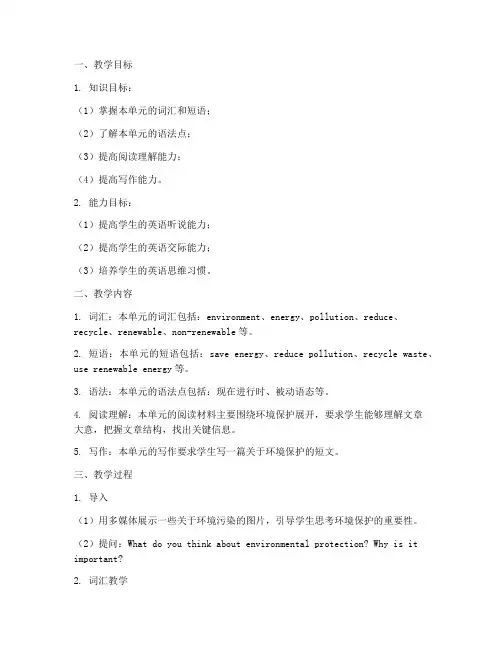
一、教学目标1. 知识目标:(1)掌握本单元的词汇和短语;(2)了解本单元的语法点;(3)提高阅读理解能力;(4)提高写作能力。
2. 能力目标:(1)提高学生的英语听说能力;(2)提高学生的英语交际能力;(3)培养学生的英语思维习惯。
二、教学内容1. 词汇:本单元的词汇包括:environment、energy、pollution、reduce、recycle、renewable、non-renewable等。
2. 短语:本单元的短语包括:save energy、reduce pollution、recycle waste、use renewable energy等。
3. 语法:本单元的语法点包括:现在进行时、被动语态等。
4. 阅读理解:本单元的阅读材料主要围绕环境保护展开,要求学生能够理解文章大意,把握文章结构,找出关键信息。
5. 写作:本单元的写作要求学生写一篇关于环境保护的短文。
三、教学过程1. 导入(1)用多媒体展示一些关于环境污染的图片,引导学生思考环境保护的重要性。
(2)提问:What do you think about environmental protection? Why is it important?2. 词汇教学(1)讲解本单元的词汇,并举例说明。
(2)让学生进行词汇接龙游戏,巩固所学词汇。
3. 短语教学(1)讲解本单元的短语,并举例说明。
(2)让学生进行短语造句,提高运用能力。
4. 语法教学(1)讲解现在进行时和被动语态的用法。
(2)让学生进行语法练习,巩固所学语法点。
5. 阅读理解(1)阅读课文,找出文章大意和关键信息。
(2)讨论课文内容,提高阅读理解能力。
6. 写作指导(1)讲解写作要求,让学生了解写作思路。
(2)指导学生如何写一篇关于环境保护的短文。
7. 练习(1)让学生完成课后练习,巩固所学知识。
(2)教师对学生的练习进行点评和指导。
8. 总结(1)回顾本节课所学内容,总结重点。
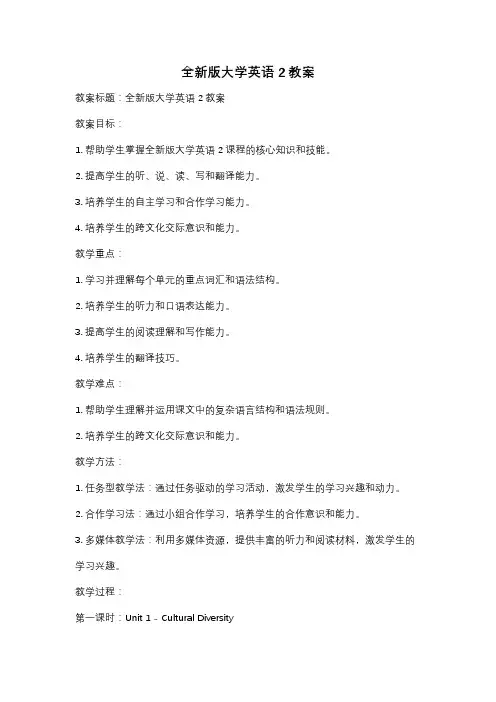
全新版大学英语2教案教案标题:全新版大学英语2教案教案目标:1. 帮助学生掌握全新版大学英语2课程的核心知识和技能。
2. 提高学生的听、说、读、写和翻译能力。
3. 培养学生的自主学习和合作学习能力。
4. 培养学生的跨文化交际意识和能力。
教学重点:1. 学习并理解每个单元的重点词汇和语法结构。
2. 培养学生的听力和口语表达能力。
3. 提高学生的阅读理解和写作能力。
4. 培养学生的翻译技巧。
教学难点:1. 帮助学生理解并运用课文中的复杂语言结构和语法规则。
2. 培养学生的跨文化交际意识和能力。
教学方法:1. 任务型教学法:通过任务驱动的学习活动,激发学生的学习兴趣和动力。
2. 合作学习法:通过小组合作学习,培养学生的合作意识和能力。
3. 多媒体教学法:利用多媒体资源,提供丰富的听力和阅读材料,激发学生的学习兴趣。
教学过程:第一课时:Unit 1 - Cultural Diversity1. 导入:通过图片和视频介绍不同文化背景下的风俗习惯,引发学生的兴趣和思考。
2. 听力训练:播放一段关于跨文化交际的对话,要求学生听并回答问题。
3. 语言点讲解:介绍并解释本单元的重点词汇和语法结构,如形容词比较级和最高级。
4. 合作学习活动:分成小组,让学生讨论并展示不同文化背景下的习俗和价值观。
5. 语言实践:要求学生以小组为单位,编写一篇关于自己文化背景的短文,并进行口头演讲。
第二课时:Unit 2 - Environmental Protection1. 导入:通过图片和视频介绍环境保护的重要性,引发学生的兴趣和思考。
2. 阅读训练:分发一篇关于环境保护的文章,要求学生阅读并回答问题。
3. 语言点讲解:介绍并解释本单元的重点词汇和语法结构,如情态动词的用法。
4. 听力训练:播放一段关于环境问题的对话,要求学生听并回答问题。
5. 合作学习活动:分成小组,让学生讨论并提出环境保护的解决方案。
6. 语言实践:要求学生以小组为单位,撰写一篇关于环境保护的建议信,并进行口头演讲。
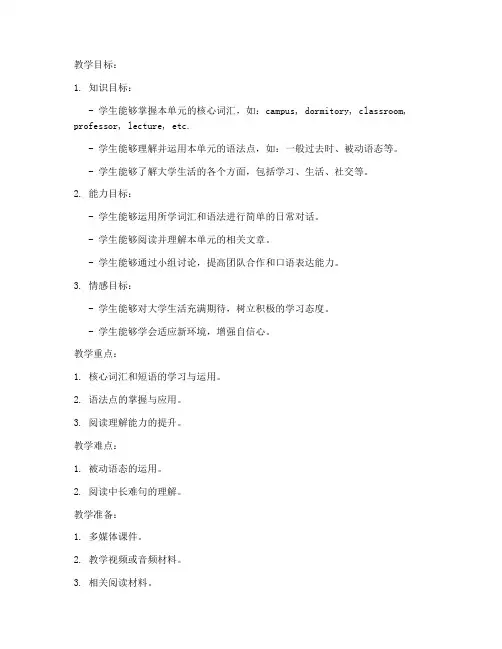
1. 知识目标:- 学生能够掌握本单元的核心词汇,如:campus, dormitory, classroom, professor, lecture, etc.- 学生能够理解并运用本单元的语法点,如:一般过去时、被动语态等。
- 学生能够了解大学生活的各个方面,包括学习、生活、社交等。
2. 能力目标:- 学生能够运用所学词汇和语法进行简单的日常对话。
- 学生能够阅读并理解本单元的相关文章。
- 学生能够通过小组讨论,提高团队合作和口语表达能力。
3. 情感目标:- 学生能够对大学生活充满期待,树立积极的学习态度。
- 学生能够学会适应新环境,增强自信心。
教学重点:1. 核心词汇和短语的学习与运用。
2. 语法点的掌握与应用。
3. 阅读理解能力的提升。
教学难点:1. 被动语态的运用。
2. 阅读中长难句的理解。
教学准备:1. 多媒体课件。
2. 教学视频或音频材料。
3. 相关阅读材料。
一、导入(5分钟)1. 利用图片或视频展示大学校园生活,激发学生的学习兴趣。
2. 提问:What do you think about college life? 引导学生思考大学生活。
二、词汇教学(15分钟)1. 教师展示核心词汇,如:campus, dormitory, classroom, professor, lecture等,并解释其含义。
2. 学生跟读,加深印象。
3. 利用游戏或练习,让学生运用所学词汇进行对话。
三、语法教学(10分钟)1. 教师讲解一般过去时和被动语态的用法。
2. 学生通过例句理解语法点。
3. 学生进行语法练习,巩固所学知识。
四、阅读教学(15分钟)1. 教师简要介绍阅读材料,引导学生了解文章大意。
2. 学生自主阅读,找出文章中的关键信息。
3. 教师提问,检查学生对文章的理解。
五、小组讨论(10分钟)1. 将学生分成小组,讨论以下问题:- What are the differences between high school and college life?- How do you adapt to college life?2. 小组成员轮流发言,分享自己的观点。
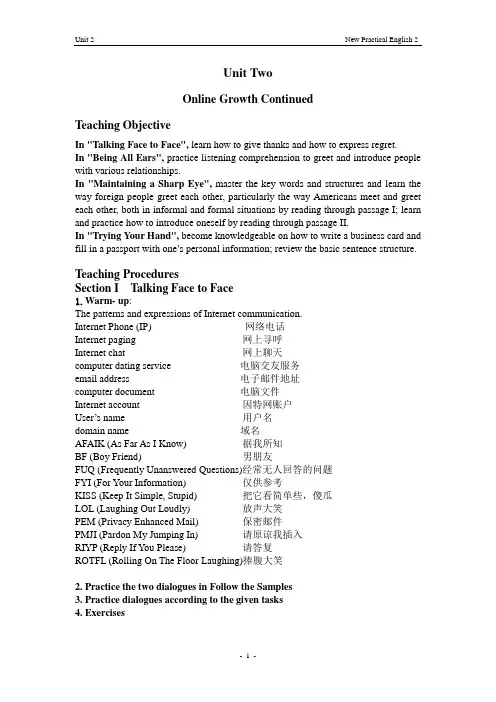
Unit TwoOnline Growth ContinuedTeaching ObjectiveIn "Talking Face to Face", learn how to give thanks and how to express regret.In "Being All Ears", practice listening comprehension to greet and introduce people with various relationships.In "Maintaining a Sharp Eye", master the key words and structures and learn the way foreign people greet each other, particularly the way Americans meet and greet each other, both in informal and formal situations by reading through passage I; learn and practice how to introduce oneself by reading through passage II.In "Trying Your Hand", become knowledgeable on how to write a business card and fill in a passport with one’s personal information; review the basic sentence structure. Teaching ProceduresSection I Talking Face to Face1.Warm- up:The patterns and expressions of Internet communication.Internet Phone (IP) 网络电话Internet paging 网上寻呼Internet chat 网上聊天computer dating service 电脑交友服务email address 电子邮件地址computer document 电脑文件Internet account 因特网账户User’s name 用户名domain name 域名AFAIK (As Far As I Know) 据我所知BF (Boy Friend) 男朋友FUQ (Frequently Unanswered Questions)经常无人回答的问题FYI (For Your Information) 仅供参考KISS (Keep It Simple, Stupid) 把它看简单些,傻瓜LOL (Laughing Out Loudly) 放声大笑PEM (Privacy Enhanced Mail) 保密邮件PMJI (Pardon My Jumping In) 请原谅我插入RIYP (Reply If You Please) 请答复ROTFL (Rolling On The Floor Laughing)捧腹大笑2. Practice the two dialogues in Follow the Samples3. Practice dialogues according to the given tasks4. ExercisesSection II Being All EarsSee the textbook.Section III Maintaining a Sharp EyePassage I Online Growth ContinuedText-related InformationWays for Internet Connection:There are several ways for Internet connection. One common way is dial-up connection. For dial-up connection, you need a computer, a modem, and a telephone line.ISP is the abbreviation of Internet Service Provider. It provides services for Internet users to get connected with the Internet. Before getting connected with the Internet, an Internet user must apply for an account and a password from an ISP. He or she should also get its dial-up number, the addresses of its domainname and of the mail server.Now you can turn on your computer, start the dial-up program and get connected with the Internet. Then you can use the browser to enjoy the world of Internet. You can also send or receive emails with the help of the emails.People can do a lot of things by browsing Internet, such as sharing information, transacting business and communicating with people across the globe.Text ExplanationPara.1In just five years,the World Wide Web has become a powerful new medium for sharing information, conducting business and communicating with people across the room or across the world.Language Points:1.Explanation of Difficult SentencesIn just five years,…Analysis:In just five years implies in the five years just past, and the main verb of the sentence usually takes present perfect tense. Across the room and across the world are given here to indicate the wide range of use of the Internet.Translation: 在仅仅5年的时间里,全球范围网已经成为一种新媒体,使人们能够从小到房间内大到全球范围分享信息、处理业务并相互流。
课程目标:1. 通过本单元的学习,学生能够了解健康生活的相关词汇和表达方式。
2. 学生能够运用所学的词汇和表达方式,进行简单的日常对话。
3. 培养学生关注健康、积极生活的意识。
教学重点:1. 健康生活的相关词汇和表达方式。
2. 健康生活的话题讨论。
教学难点:1. 学生在表达健康生活观点时,能够使用正确的语法和词汇。
2. 培养学生良好的生活习惯。
教学时间:2课时教学内容:1. 课文学习2. 词汇和短语学习3. 语法讲解4. 课堂活动教学过程:第一课时一、导入1. 教师简要介绍健康生活的重要性,引起学生兴趣。
2. 学生分享自己日常生活中的健康习惯。
二、课文学习1. 学生阅读课文,了解健康生活的相关内容。
2. 教师带领学生分析课文中的重点词汇和短语。
3. 学生跟读课文,模仿语音语调。
三、词汇和短语学习1. 教师展示健康生活的相关词汇和短语,如:healthy, exercise, diet, sleep, stress等。
2. 学生跟读并模仿,加深印象。
3. 教师讲解词汇和短语的用法,并进行例句练习。
四、语法讲解1. 教师讲解本单元的语法点:一般现在时和一般过去时。
2. 学生通过练习,巩固所学语法知识。
五、课堂活动1. 学生分组进行角色扮演,模拟健康生活的场景。
2. 每组选出代表,向全班展示表演。
第二课时一、复习1. 教师提问,检查学生对上节课所学内容的掌握情况。
2. 学生回答问题,巩固所学知识。
二、课文学习1. 学生阅读课文,回顾健康生活的相关内容。
2. 教师引导学生分析课文中的重点句型。
三、词汇和短语学习1. 教师展示更多健康生活的相关词汇和短语,如:vitamin, mineral, weight loss, yoga等。
2. 学生跟读并模仿,加深印象。
3. 教师讲解词汇和短语的用法,并进行例句练习。
四、语法讲解1. 教师讲解本单元的语法点:现在进行时。
2. 学生通过练习,巩固所学语法知识。
五、课堂活动1. 学生分组进行辩论,讨论健康生活的重要性。
Unit 2 FriendshipTeaching hours: 6-8 hours totalI. Teaching aims and demands:1.To master the new target words and useful phrases;2.To comprehend the whole text;3.To summarize the main points of the text.II. Background information.1.Friendship is a treasure that always helps us overcome any kind of difficulty. Friendship isa comfort which always understands worries and emotions. Friendship is a blessingbecause it teaches the way to live.2.Marx valued Engels’ friendship so highly that he once said h e loved and admired hisfriend very much. Engels had been aiding Marx who suffered greatly from bitter poverty.Were it not for the help Marx obtained from Engels, Marx would hardly have been able to overcome poverty and he surely would not have left behind him a monument.III. Warm-up1.English Song —That’s What Friends Are For2.Questions about the Song and the Texts1).What is a fair-weather friend?2). Do you know anything about the singers?3). According to the song, what are friends for?IV. Language points1. be lost in / lose oneself in:1) be absorbed inEg: He was lost in playing computer games so he was unaware of my entering the room.I had lost myself in thought.He was lost to the world in this task.2. available: adj.1) able to be got, obtained, used, etc.Eg: If you don’t want to buy a kite, you can make your own using directions available in the book.We have already used up all the available space.2) able to be visited or seen; not too busyEg: The lawyer is not available now.Here’s some money. Get yourself a sandwich or something.3. go ahead:1) continue; begin (sometimes followed by with + n.)Eg: Henry will be late but we will go ahead with the meeting anyway.The board of directors will vote today on whether to go ahead with the plan.4. estimate:1) vt. form a judgment about (a quantity or value)Eg :Bill’s personal riches were estimated at $368 million.2) n. approximate calculation or judgment made about a quantity or valueEg: According to some estimates, the number of farms has increased by 50 percent.辨析:estimate, evaluate & value这些词都有“估计”或“估价”的意思。